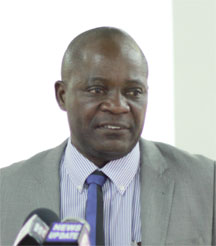A Management Audit is to be done by the University of Guyana (UG) as its administrators look to assess and improve the current system.
A Special Audit, carried out into the university’s finances has recently been completed and UG’s Vice Chancellor (VC) Jacob Opadeyi says steps are being taken to address the faults cited by the auditors in their report.
But UG’s transformation is to be multifaceted and Opadeyi, during a press conference on Monday,
revealed his belief that a Management Audit is also needed and therefore soon to be conducted.

“We are backing on a Management Audit because we want to find out whether we have been following our admission regulations, whether we are following our HR (Human Resource) regulations properly, whether we are doing what we are supposed to do or are our regulations being ignored and we are just doing what we want to do as in the case of the bursary,” Opadeyi explained.
Among the areas to be addressed in this audit are sexual harassment policies and regulations, late submissions of marks by lecturers, the university’s quality assurance systems, the poor level of staff salaries and compensation and the improvement of facilities.
The university will be taking the enforcement of its regulations very seriously, Opadeyi told reporters. In fact, he said that a staff member was sent home on Monday because of a sexual harassment issue. “I am sending a signal to the national community and students that this VC will not tolerate any form of sexual harassment at this university,” he said.
The late submission of grades, which has been a longstanding issue at UG, still plagues the university and must be addressed especially considering its propensity to affect registration processes.
“We cannot understand why a lecturer would not be able to mark a script within two months [or] within three months.
Up to now we have not received all the marks for the second semester and classes have started and students want their grade to move on to other programmes or to move on to other things,” he said.
Opadeyi was particularly annoyed at a situation in which several students who had done well in Biology and were desirous of moving on to Medicine were denied access because the programme was full by the time they received their grades. Because the students had done very well, Opadeyi said, he was forced to intervene and ask that space be made for them.
As it relates to quality assurance, the VC announced that in this coming year all programmes will have a second examiner while all third and fourth year courses will have external examiners. This is to ensure that marks that will be received by third and fourth year students will be scrutinised by their lecturers as well as external onlookers.
The university’s administration will also be looking to resolve the matter of raising the pay of the university’s staff, particularly its lecturers. This is yet another longstanding issue which university has been grappling with. And on Monday Opadeyi was adamant that “we cannot run a quality university using salaries that are not conducive to decent living.”
Regrettably, Opadeyi shared, a lecturer’s appointment was terminated after it was discovered that he was charging students for extra lessons. “We cannot create an environment where our staff members will be looking for means of increasing their income, the salary has to be increased and compensation has to be looked at.”
The VC also said that he was open to hearing all claims being made about questionable activities that might be ongoing at the university. Asked about allegations of the selling of test papers in the law faculty, Opadeyi said that such a claim was made, but said that no evidence of such activities were found.
He disclosed that the Hugh Wooding Law School in Trinidad had written to him expressing concerns after an anonymous writer wrote to that facility complaining that test papers were being sold in the law faculty. “Their concern is a serious concern,” Opadeyi said, and added that the issue is extremely important considering that UG is looking to have the law school take 35 students yearly as opposed to the 25 it currently takes.
After a two-week investigation, Opadeyi said, he found no evidence to substantiate the claims made by the anonymous writer.
A thorough examination revealed that the pass rates for the courses for which it was alleged test papers had been sold was less than 50%, he said.
“There was no set of persons who were getting 80% (or) 90%. That’s what you do when you buy an examination paper. It’s very easy, when you get the questions you can go and work hard on the questions and get all your citations. [But] there was no evidence of it at all,” he said.
The entire ordeal is regrettable, Opadeyi said, while revealing that similar situations occur each year. Realising that they might not be part of the few selected students to move on to the law school in Trinidad, some students try to sabotage the successful students who do, and in the process, they succeed in tainting the reputations of the lecturers who deliver the courses in the Law Faculty, he said.








